-
 Bitcoin
Bitcoin $117500
2.15% -
 Ethereum
Ethereum $3911
6.19% -
 XRP
XRP $3.316
10.79% -
 Tether USDt
Tether USDt $1.000
0.01% -
 BNB
BNB $787.2
2.24% -
 Solana
Solana $175.2
4.15% -
 USDC
USDC $0.9999
0.00% -
 Dogecoin
Dogecoin $0.2225
8.40% -
 TRON
TRON $0.3383
0.28% -
 Cardano
Cardano $0.7868
6.02% -
 Stellar
Stellar $0.4382
9.34% -
 Hyperliquid
Hyperliquid $40.92
7.56% -
 Sui
Sui $3.764
7.63% -
 Chainlink
Chainlink $18.48
10.66% -
 Bitcoin Cash
Bitcoin Cash $582.1
1.88% -
 Hedera
Hedera $0.2601
6.30% -
 Avalanche
Avalanche $23.33
4.94% -
 Ethena USDe
Ethena USDe $1.001
0.02% -
 Litecoin
Litecoin $122.3
2.04% -
 UNUS SED LEO
UNUS SED LEO $8.969
-0.27% -
 Toncoin
Toncoin $3.339
0.86% -
 Shiba Inu
Shiba Inu $0.00001287
4.30% -
 Uniswap
Uniswap $10.43
7.38% -
 Polkadot
Polkadot $3.861
5.08% -
 Dai
Dai $1.000
0.02% -
 Bitget Token
Bitget Token $4.513
3.41% -
 Monero
Monero $267.7
-6.18% -
 Cronos
Cronos $0.1499
4.14% -
 Pepe
Pepe $0.00001110
5.15% -
 Aave
Aave $284.9
8.28%
What is Paper Wallet? How is it used to store cryptocurrency offline?
Paper wallets offer simple, offline cryptocurrency storage, but their security relies entirely on physical protection, making them vulnerable to loss or damage; safer alternatives like hardware wallets are recommended.
Mar 22, 2025 at 12:28 am
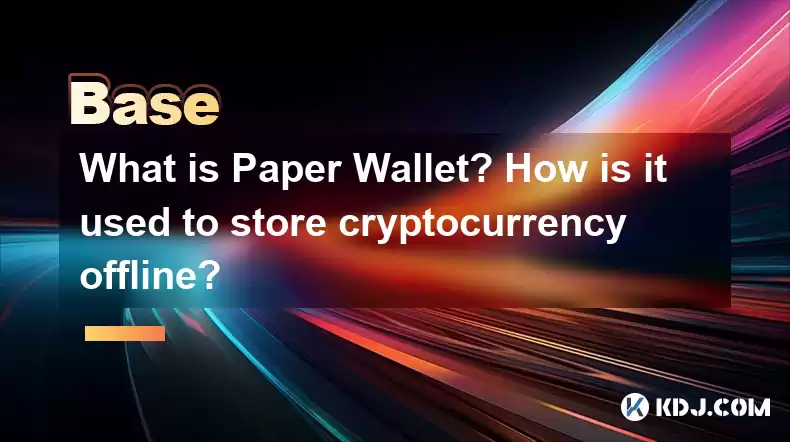
Key Points:
- Paper wallets offer a simple, offline method for storing cryptocurrency.
- They involve generating public and private keys and printing them on paper.
- Security relies heavily on physical protection of the paper wallet.
- They are vulnerable to damage, loss, and theft.
- Alternative, more secure methods exist for offline storage.
What is a Paper Wallet?
A paper wallet is a simple method for storing cryptocurrencies offline. It's essentially a piece of paper containing your public and private keys for a specific cryptocurrency. Your public key is like your bank account number – it allows others to send you cryptocurrency. Your private key is like your bank password – it's crucial for authorizing transactions and accessing your funds. Losing your private key means losing access to your cryptocurrency forever. Because the keys are stored offline, a paper wallet is considered a cold storage solution, offering a layer of protection against online hacking.
How to Create a Paper Wallet?
Creating a paper wallet involves generating your cryptocurrency addresses and their corresponding private keys using specialized software or online generators. It's crucial to use reputable and trustworthy tools to ensure the security of your keys. After generating the keys, you'll need to print them clearly on a piece of paper. Some generators even offer printable templates to organize the information neatly. Remember, this printed document is your paper wallet, and its security is paramount.
Using a Paper Wallet to Store Cryptocurrency Offline:
- Generate Keys: Use a reputable offline wallet generator to create your public and private key pair. Ensure the generator is downloaded from the official website to avoid malware.
- Print the Wallet: Print the public and private keys clearly on durable paper. Consider using a high-quality printer and archival-quality paper to prevent fading or damage.
- Secure the Wallet: Store the paper wallet in a safe, secure location, away from any potential threats like fire, water damage, or theft. A fireproof safe or a safety deposit box are good options.
- Receiving Cryptocurrency: Share your public key (address) with anyone who wants to send you cryptocurrency.
- Sending Cryptocurrency: Use your private key to authorize transactions from your paper wallet. This usually involves importing the private key into a compatible cryptocurrency wallet software or hardware wallet.
Security Considerations of Paper Wallets:
Paper wallets offer a level of security against online attacks because they remain completely offline. However, they're vulnerable to physical threats. Loss, theft, or damage to the paper wallet can result in the permanent loss of your cryptocurrency. Physical security is paramount. The paper itself can degrade over time, making the keys illegible. Accidental destruction or even a simple tear could render your keys unusable.
Alternatives to Paper Wallets:
Hardware wallets offer significantly greater security than paper wallets. These are physical devices that store your private keys offline, providing a more robust solution against physical theft and damage. They usually feature a secure element, a tamper-proof chip that protects your keys. Hardware wallets also offer advanced features like multi-signature support and recovery options.
Common Questions and Answers:
Q: Are paper wallets truly secure?
A: While paper wallets offer offline security against online attacks, they are vulnerable to physical damage, loss, or theft. Their security relies entirely on the physical protection of the paper. More secure options like hardware wallets are generally recommended.
Q: Can I reuse a paper wallet address?
A: Generally, it's not recommended to reuse a paper wallet address. While technically possible, reusing an address can compromise your privacy and security. Each transaction using the same address creates a linkable record of your activity on the blockchain.
Q: How do I recover my cryptocurrency if I lose my paper wallet?
A: If you lose your paper wallet, including the private key, your cryptocurrency is irretrievably lost. There is no recovery mechanism for lost private keys. This underscores the importance of securely storing your paper wallet.
Q: What types of paper are best for creating a paper wallet?
A: Use high-quality, durable paper that resists fading and tearing. Archival-quality paper or tamper-evident paper are good choices. Avoid using ordinary printer paper, as it's more prone to damage.
Q: Can I use a paper wallet for all cryptocurrencies?
A: No, each cryptocurrency has its own address format. You need to generate a paper wallet specifically for the cryptocurrency you intend to store. Using the wrong address will result in the loss of your funds.
Q: Is it safe to use an online paper wallet generator?
A: While convenient, online generators carry inherent risks. Make sure you are using a reputable generator from a trusted source and be cautious of malicious websites that could steal your keys. Offline generation is always safer.
Q: What should I do if my paper wallet is damaged?
A: If your paper wallet is damaged, and you can still read the private key, immediately transfer your funds to a more secure storage solution like a hardware wallet. If the private key is illegible, your funds are likely lost.
Q: Are there any legal implications associated with paper wallets?
A: The legality of cryptocurrencies and their storage methods varies depending on your jurisdiction. It's crucial to understand and comply with the relevant laws and regulations in your country or region. Paper wallets themselves are not illegal, but the use of cryptocurrencies might be restricted in some areas.
Disclaimer:info@kdj.com
The information provided is not trading advice. kdj.com does not assume any responsibility for any investments made based on the information provided in this article. Cryptocurrencies are highly volatile and it is highly recommended that you invest with caution after thorough research!
If you believe that the content used on this website infringes your copyright, please contact us immediately (info@kdj.com) and we will delete it promptly.
- Stablecoins, Hong Kong, and On-Chain Finance: Navigating the Regulatory Maze
- 2025-08-08 12:30:12
- Tron's Sell-Off Spurs Altcoin Shift: What's Next for TRX?
- 2025-08-08 08:30:12
- Euler, DeFi, and Coinbase: A New York Minute on the Latest Buzz
- 2025-08-08 12:30:12
- RUVI Presale: Is the Growth Potential Real?
- 2025-08-08 09:10:12
- Sleep Token's US Takeover: Thornhill Rides the 'Even In Arcadia' Wave
- 2025-08-08 08:30:12
- FTT Token's Wild Ride: Creditor Repayments vs. Market Drop - A New Yorker's Take
- 2025-08-08 07:10:12
Related knowledge
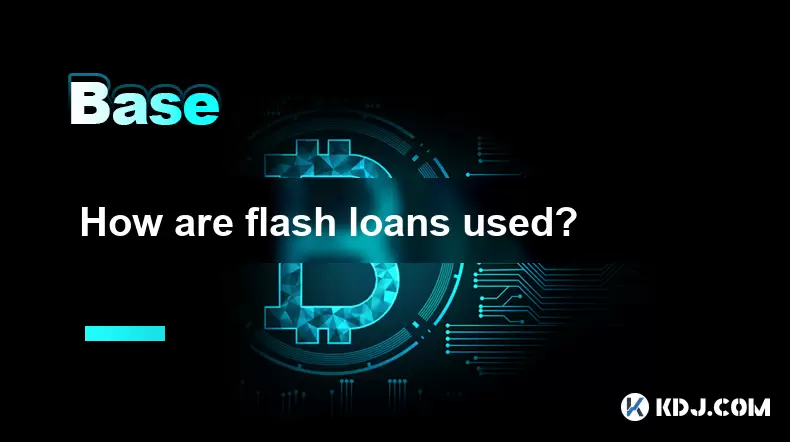
How are flash loans used?
Aug 08,2025 at 01:08pm
Understanding Flash Loans in Decentralized FinanceFlash loans are a unique innovation within the decentralized finance (DeFi) ecosystem, allowing user...
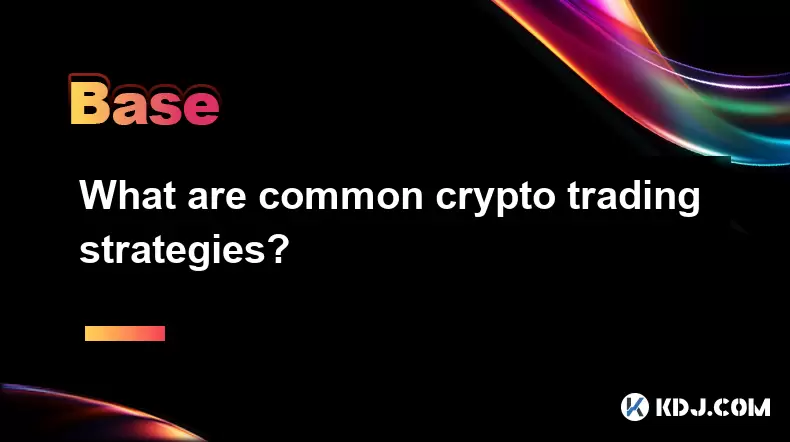
What are common crypto trading strategies?
Aug 08,2025 at 12:42pm
Understanding Trend Following in Crypto TradingTrend following is one of the most widely adopted crypto trading strategies due to its simplicity and a...
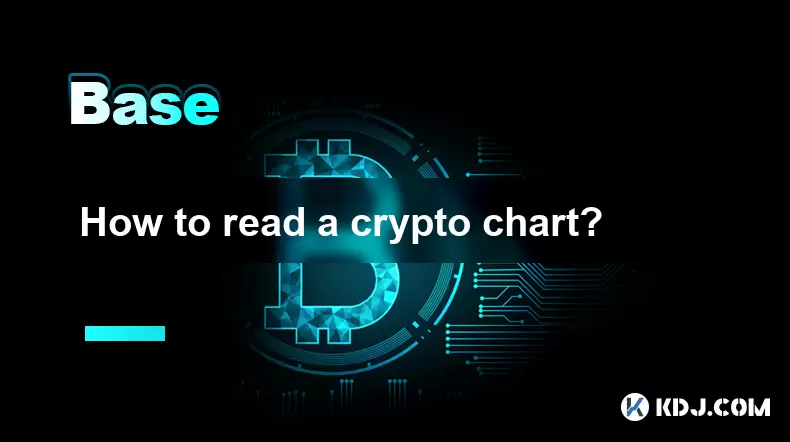
How to read a crypto chart?
Aug 08,2025 at 10:35am
Understanding the Basics of a Crypto ChartA crypto chart is a visual representation of the price movements of a cryptocurrency over time. These charts...
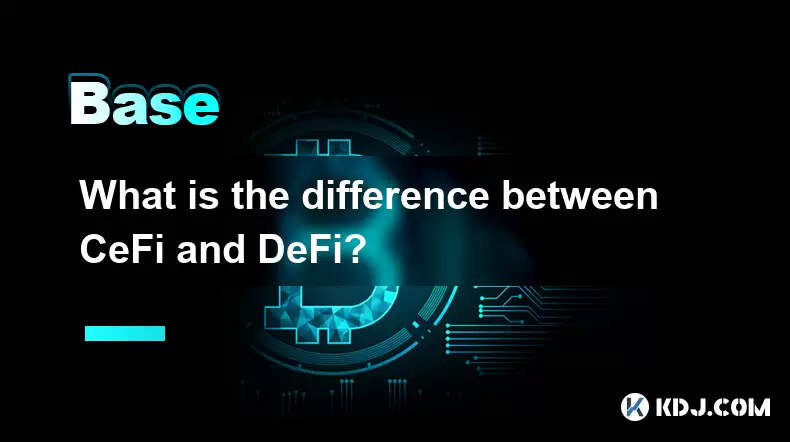
What is the difference between CeFi and DeFi?
Jul 22,2025 at 12:28am
Understanding CeFi and DeFiIn the world of cryptocurrency, CeFi (Centralized Finance) and DeFi (Decentralized Finance) represent two distinct financia...

How to qualify for potential crypto airdrops?
Jul 23,2025 at 06:49am
Understanding What Crypto Airdrops AreCrypto airdrops refer to the distribution of free tokens or coins to a large number of wallet addresses, often u...
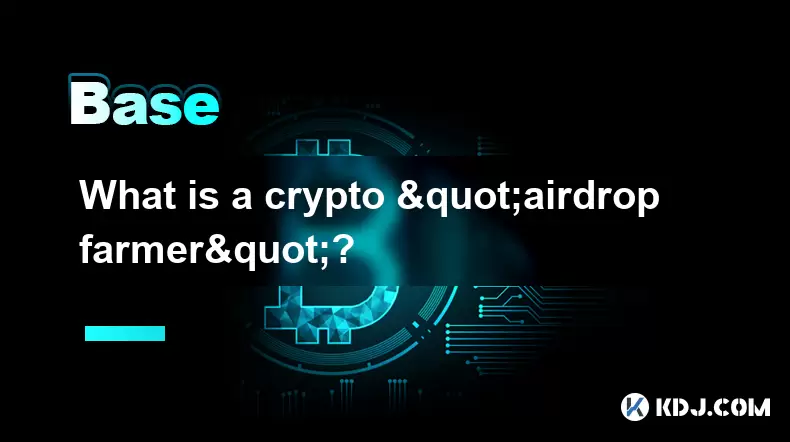
What is a crypto "airdrop farmer"?
Jul 24,2025 at 10:22pm
Understanding the Role of a Crypto 'Airdrop Farmer'A crypto 'airdrop farmer' refers to an individual who actively participates in cryptocurrency airdr...

How are flash loans used?
Aug 08,2025 at 01:08pm
Understanding Flash Loans in Decentralized FinanceFlash loans are a unique innovation within the decentralized finance (DeFi) ecosystem, allowing user...

What are common crypto trading strategies?
Aug 08,2025 at 12:42pm
Understanding Trend Following in Crypto TradingTrend following is one of the most widely adopted crypto trading strategies due to its simplicity and a...

How to read a crypto chart?
Aug 08,2025 at 10:35am
Understanding the Basics of a Crypto ChartA crypto chart is a visual representation of the price movements of a cryptocurrency over time. These charts...

What is the difference between CeFi and DeFi?
Jul 22,2025 at 12:28am
Understanding CeFi and DeFiIn the world of cryptocurrency, CeFi (Centralized Finance) and DeFi (Decentralized Finance) represent two distinct financia...

How to qualify for potential crypto airdrops?
Jul 23,2025 at 06:49am
Understanding What Crypto Airdrops AreCrypto airdrops refer to the distribution of free tokens or coins to a large number of wallet addresses, often u...

What is a crypto "airdrop farmer"?
Jul 24,2025 at 10:22pm
Understanding the Role of a Crypto 'Airdrop Farmer'A crypto 'airdrop farmer' refers to an individual who actively participates in cryptocurrency airdr...
See all articles

























































































